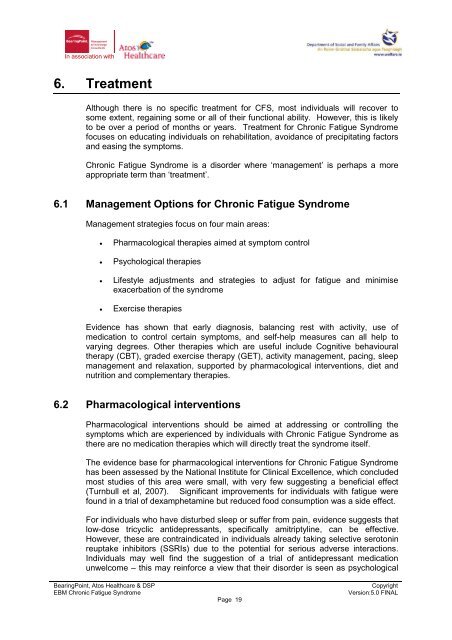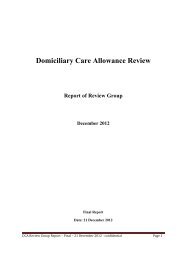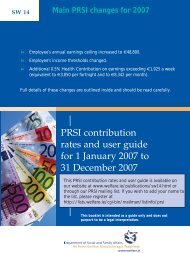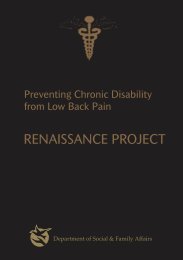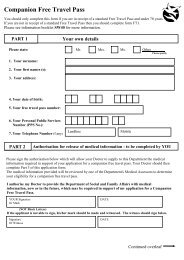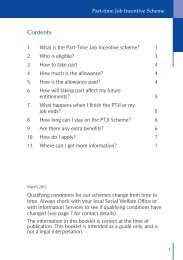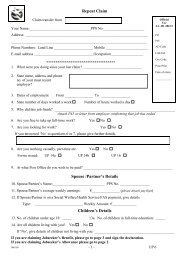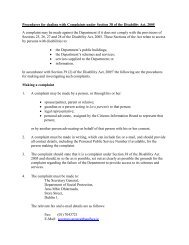Chronic Fatigue Syndrome - Welfare.ie
Chronic Fatigue Syndrome - Welfare.ie
Chronic Fatigue Syndrome - Welfare.ie
Create successful ePaper yourself
Turn your PDF publications into a flip-book with our unique Google optimized e-Paper software.
In association with6. TreatmentAlthough there is no specific treatment for CFS, most individuals will recover tosome extent, regaining some or all of their functional ability. However, this is likelyto be over a period of months or years. Treatment for <strong>Chronic</strong> <strong>Fatigue</strong> <strong>Syndrome</strong>focuses on educating individuals on rehabilitation, avoidance of precipitating factorsand easing the symptoms.<strong>Chronic</strong> <strong>Fatigue</strong> <strong>Syndrome</strong> is a disorder where ‘management’ is perhaps a moreappropriate term than ‘treatment’.6.1 Management Options for <strong>Chronic</strong> <strong>Fatigue</strong> <strong>Syndrome</strong>Management strateg<strong>ie</strong>s focus on four main areas:Pharmacological therap<strong>ie</strong>s aimed at symptom controlPsychological therap<strong>ie</strong>sLifestyle adjustments and strateg<strong>ie</strong>s to adjust for fatigue and minimiseexacerbation of the syndromeExercise therap<strong>ie</strong>sEvidence has shown that early diagnosis, balancing rest with activity, use ofmedication to control certain symptoms, and self-help measures can all help tovarying degrees. Other therap<strong>ie</strong>s which are useful include Cognitive behaviouraltherapy (CBT), graded exercise therapy (GET), activity management, pacing, sleepmanagement and relaxation, supported by pharmacological interventions, d<strong>ie</strong>t andnutrition and complementary therap<strong>ie</strong>s.6.2 Pharmacological interventionsPharmacological interventions should be aimed at addressing or controlling thesymptoms which are exper<strong>ie</strong>nced by individuals with <strong>Chronic</strong> <strong>Fatigue</strong> <strong>Syndrome</strong> asthere are no medication therap<strong>ie</strong>s which will directly treat the syndrome itself.The evidence base for pharmacological interventions for <strong>Chronic</strong> <strong>Fatigue</strong> <strong>Syndrome</strong>has been assessed by the National Institute for Clinical Excellence, which concludedmost stud<strong>ie</strong>s of this area were small, with very few suggesting a beneficial effect(Turnbull et al, 2007). Significant improvements for individuals with fatigue werefound in a trial of dexamphetamine but reduced food consumption was a side effect.For individuals who have disturbed sleep or suffer from pain, evidence suggests thatlow-dose tricyclic antidepressants, specifically amitriptyline, can be effective.However, these are contraindicated in individuals already taking selective serotoninreuptake inhibitors (SSRIs) due to the potential for serious adverse interactions.Individuals may well find the suggestion of a trial of antidepressant medicationunwelcome – this may reinforce a v<strong>ie</strong>w that their disorder is seen as psychologicalBearingPoint, Atos Healthcare & DSPEBM <strong>Chronic</strong> <strong>Fatigue</strong> <strong>Syndrome</strong>Page 19CopyrightVersion:5.0 FINAL


